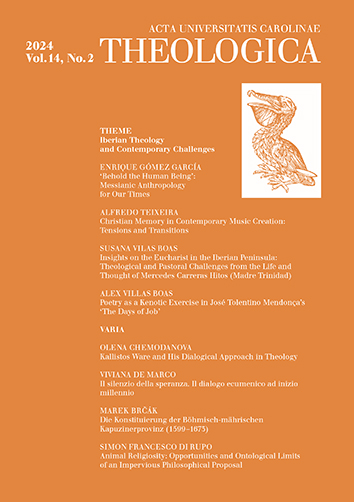AUC Theologica is a peer-reviewed journal for theology published twice a year. As we publish original papers in English, German, French, and Italian, our mission is to serve as a platform both for Czech researchers, who can present their research results in these languages, and for international contributors, who are invited to enter the academic theological discussion in the heart of Europe.
The journal focuses on a wide range of theological disciplines, such as systematic theology, biblical studies, patristic studies, pastoral and spiritual theology, religious education, church history, etc. Within these fields, the journal seeks to reflect the current theological questions and problems, which often requires interdisciplinary approaches. Supporting the intersection of various theological disciplines, we thus also welcome theological papers touching other academic fields including philosophy, sociology, literary studies, and science.
Each issue consists of two sections. The thematic section presents papers of the same focus. The section called ‘Varia’ invites papers dealing with various theological themes from the perspective of all Christian traditions. Our current and past issues are approachable for free on this website in the form of Open Access.
AUC THEOLOGICA, Vol 8 No 2 (2018), 111–125
Martin Luther’s Relational Ontology
[Martin Luther’s Relational Ontology]
Ľubomír Žák
DOI: https://doi.org/10.14712/23363398.2018.53
published online: 08. 03. 2019
abstract
In the second half of the twentieth century, the overcoming of the infuence of Kant’s philosophy on the interpretation of Luther’s theology gave the impetus to a new shift in the Luther studies. However, it also revealed the importance of the theological intuitions of the Reformer on the current philosophical-theological debate on the possibility of restoring metaphysics and ontology in particular. The study aims to present the ontological dimension and the orientation of some of these intuitions present in Luther’s commentary on the Letter to the Romans. This dimension is determined by his conviction that the revelation of the trinitarian God in Christ has shown the truth of being in general, and of human being in particular, the truth of the fact that this being is structurally related but also of the fact that, in the historical space, this relationship has to bring to date and to augment what is happeniing by means of following the Crucified and Risen Logos of the Creator, and uniting with his Holy Spirit in the communion of believers.
keywords: Martin Luther; Letter to the Romans; Rethinking Ontology; Ontology and Revelation; Relational Ontology

Martin Luther’s Relational Ontology is licensed under a Creative Commons Attribution 4.0 International License.
148 x 210 mm
periodicity: 2 x per year
print price: 100 czk
ISSN: 1804-5588
E-ISSN: 2336-3398
